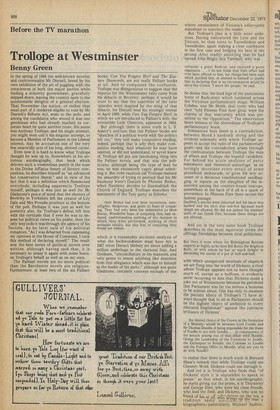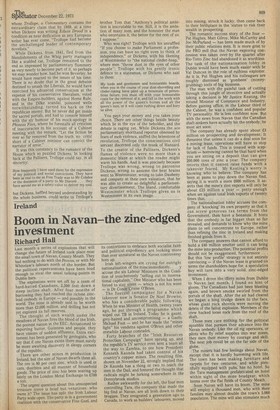Trollope at Westminster
Benny Green
In the spring of 1868 the well-known novelist and controversialist Mr Disraeli, bored by his own exhibition of the art of juggling with the consciences of both the major parties while leading a minority government, gracefully stepped down, leaving the country open to the questionable delights of a general election. That November the nation, or rather that small part of it rendered eligible to vote by Mr Disraeli's Reform Act, went to the polls, and among the candidates who wooed it was one gentleman who had already reached its corporate heart by quite another route. His name was Anthony Trollope, and his single attempt, you might even call it his singular attempt, to become a Member of Parliament in the Liberal interest, may be accounted one of the very few unworldly acts of his long, shrewd career.
Even now it is hard to know what Trollope thought he was up to. Somewhere in his notorious autobiography, that book which delivers such a tremendous punch in the nose to the Divine Afflatus theory of literary composition, he describes himself as "an advanced but conservative liberal," and in view of the fact that it was a definition which flummoxed everybody, including apparently Trollope himself, perhaps it was just as well for Mr Gladstone's peace of mind that the electors of Beverley in Yorkshire left the creator of Lily Dale and Mrs Proudie prostrate at the bottom of the poll. Perhaps it was just as well for posterity also, for Trollope's defeat left him with the certitude that if ever he was to impose his political views on his public, then the only way todo it was through the agency of his inovels. As he later said of his political romances, "As I was debarred from expressing my opinions in the House of Commons, I took this method of declaring myself." The result was the best series of political novels ever written, although having said that, it is necessary to unsay it again with some haste, on Trollope's behalf as well as on my own.
The Palliser novels are no more political than the Barchester novels are religious. Furthermore, at least two of the six Palliser
books, Can You Forgive Her? and The Eustace Diamonds, are not really Palliser books at all. And to compound the confusion, Trollope was disingenuous to suggest that the impetus for the Westminster tales came from his debacle at Beverley; perhaps it would be truer to say that the asperities of the later episodes were inspired by the sting of that debacle, for Disraeli beat his strategic retreat in April 1868, while Can You Forgive Her?, in which we are introduced to Palliser's wife, the irresistible Lady Glencora, appeared in 1864.
But although there is some truth in L. S. Amery's stricture that the Palliser books are "sketches of a political world with the politics left out," they still make compulsive reading; indeed, perhaps that is why they make compulsive reading. And whatever he may have omitted, or did not understand, or never knew of, Trollope did put one fascinating thing into the Palliser novels, and that was the politicians, although being the type of man he was, he was excessively cagey about admitting it. But even cautious old Trollope realised the absurdity of trying to pretend that his Mr Daubeny wasn't Disraeli.In Phineas Redux, when Daubeny decides to disestablish the Church of England, Trollope describes the sentiments of the Tory party as follows: . . . their Brutus had ever been mysterious, unintelligible, dangerous, and given to feats of conjuring. They had only been too submissive to their Brutus. Wonderful feats of conjuring they had endured, understanding nothing of the manner in which they were performed, nothing of their probable results; but this feat of conjuring they would not endure.
which is a reasonably accurate analysis of what the backwoodsmen must have felt in 1867 when Disraeli blithely set about adding a million underlings to the electoral lists. And Gresham, "unconciliatory in his manners, and very prone to resent anything like desertion from that allegiance which was due to himself as the leader of his party," although not quite Gladstone, certainly conveys enough of the
wintry omniscience of Victoria's uniavourite statesman to convince the reader.
But Trollope's plan is a little more ambitious. Having caricatured the Lion and the Unicorn, he then turns to Tweedledum and Tweedledee, again making a clear confession in the first case and hedging his bets in the second, After readily admitting that he had turned John Bright into Turnbull, who was
certainly a great Radical, and enjoyed a great reputation . . I do not think that high office had ever been offered to him, but things had been said, which justified him, or seemed to himself to justify him, in declaring that in no circumstances would he serve the Crown. 'I serve the people,' he said.
he denies that the hind legs of the pantomime horse of Radicalism which lumbered across the Victorian parliamentary stage, William Cobden, was Mr Monk, that cynic who had once "told Phineas Finn how great were the charms of that inaccuracy which was permitted to the Opposition." The observation bears witness to the shrewdness of Trollope's parliamentary brain.
Somewhere here there is a contradiction, between Monk's sardonic shrug and the reverent solemnity with which Trollope appears to accept the rules of the parliamentary game, and the contradiction arises through the confrontation between Trollope the man of affairs and Trollope the hopeful candidate. For behind his acute analyses of party manoeuvre and rhetorical subterfuge, as he lovingly describes every detail of some procedural ambuscade, or gives his wry account of a decorous constitutional sandbagging, or reports on the slaughter of the innocents among the country-house teacups, somewhere at the back of it all is a spark of irreverence. In Phineas Finn there occurs the famous passage:
Datibeny's arrows were poisoned and his lance was barbed and his shot was red-hot bgcause such things are allowed. He did not poison his enemies' wells or use Greek Fire, because these things are not allowed.
And yet in the very same book Trollope describes in the most equivocal terms the offstage friendships between rival politicians: But there is none whom the Birmingham Bantam respects so highly as he does Bill Burns the Brighton Bully, or with whom he has so much delight in discussing the merits of a pot of half-and-half.
with which unexpected interlude of slapstick we are flung into the world of Dickens, a rival whom Trollope appears not to have thought much of, except as a buffoon, it evidently never occurring to him that Dickens made a joke out of Westminster because he perceived that Parliament was far too serious a business to be solemn about. One has only to measure the pietistic idiocy of Trollope's "I have always thought that to sit in Parliament should be the highest object of ambition to every educated Englishman" against the corrosive brilliance of Dickens' ... the limited choice of the Crown in the formation of a Ministry, would lie between Lord Coodle and Sir Thomas Doodle, it being impossible for the Duke of Foodle to act with Goodie ... in consequence of the breach arising out of that affair with Boodle. Giving the Leadership of the Commons to Joodle, the Exchequer to Koodle, the Colonies to Loodle and the Foreign Office to Moodie, what are you to do with Noodle?
to realise that there is much truth in Bernard Shaw's remark that while Trollope could see Chesney Wold, Dickens could see through it.
And yet it is Trollope who finds that "of Dickens' style it is impossible to speak in praise," so that when, in his autobiography, he starts giving out the prizes, it is Thackeray and George Eliot, who were his close friends, who lead the field, and Dickens, who was no friend of his at' tradition saaly
aHico^ -hrinos no the rea, a aHico^ -hrinos no the rea, a dipmm A ) tn., rear, a biographers,. particularly Michael Sadleir, whose Trollope, a Commentary contains the extraordinary claim that by 1869, at a time when Dickens was writing Edwin Drood in a condition as near deification as any European writer has ever come, "Trollope had become the unchallenged leader of contemporary novelists."
While Dickens, from 1841, fled from the blandishments of the Whig party managers like a scalded cat, Trollope remained to the end so impressed by parliamentary flummery as very nearly to become part of it, so perhaps we may wonder how, had he won Beverley, he would have reacted to the issues of his time. There is no doubt that in the great debates destined to smash the Liberals, he would have exercised his advanced conservatism at the expense of his conservative liberalism, voted with the Empire-builders, against Home Rule, and in the DiIke scandal, poisoned wells notwithstdnding, turned his back on the republican enemy. But he never did get inside the sacred portals, and had to console himself with the sly humour of his mock-apology in Phineas Finn, where he forestalls all criticism of inaccuracies in his account of a Cabinet meeting with the remark, "Let the fiction be ever so far removed from the truth, no critic short of a Cabinet minister can convict the narrator of error."
It was this constancy to the romance of the House which so puzzled Dickens. In looking back at the Pallisers, Trollope could say, in all sincerity:
How frequently I have used them for the expression of my political and social convictions. They have been as real to me as Free Trade was to Mr Cobden
or the dominion of a party to Mr Disraeli . . they have served me as a safety-valve to deliver my soul.
but Dickens, baffled beyond understanding by the whole business, could write to Trollope's
Ireland
brother Tom that "Anthony's political ambition is inscrutable to me. Still, it is the ambition of many men, and the honester the man who entertains it, the better for the rest of us, I suppose."
Who was right? Trollope with his unruffled "If you choose to .make Parliament a profession, you can have no right even to think of independence," or Dickens, with his likening of Westminster to "the national cinder-heap," where men "throw dust, in the eyes of other people"; Trollope with his gently ironic defence to a statesman, or Dickens who said to them:
My lords and gentlemen and honourable boards, when you in the course of your dust-shovelling and cinder-raking have piled up a mountain of pretentious failure, you must off with your honourable coats for the removal of it, and fall to the work with all the power of the queen's horses and all the queen's men, or it will come rushing down and bury us alive.
You pays your money and you takes your choice. There are other things beside beauty which lie in the eye of the beholder, and the debate is raging yet. While Dickens the ace parliamentary shorthand reporter obsessed by fears of mob violence, sniffed the brimstone of revolution, Trollope the conscientious civil servant discerned only the musk of Hansard. To the creator of the Pallisers, Dickens's flames of violence were no more than a domestic blaze at which the reader might warm his hands. And it was precisely because Trollope was wrong, wrong to patronise Dickens, wrong to assume the best brains went to Westminster, wrong to take Daubeny and company at their own valuation, that he was able to create so delightful a parliamentary divertissement. The bland, comfortable Westminster which Trollope gives us is Westminster in its own image.



































 Previous page
Previous page